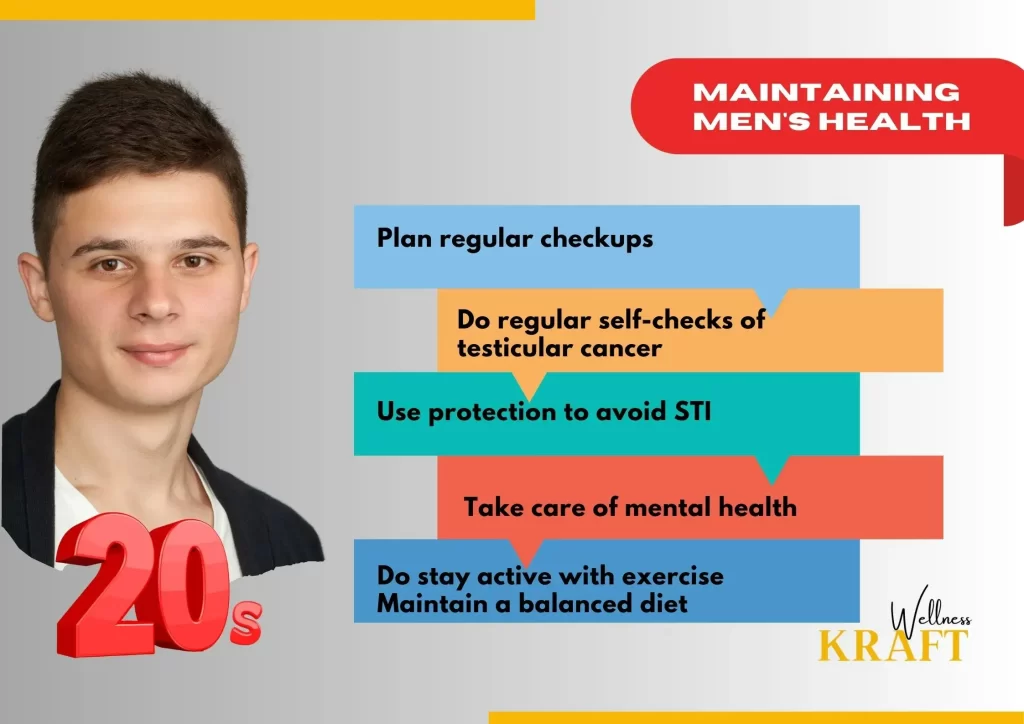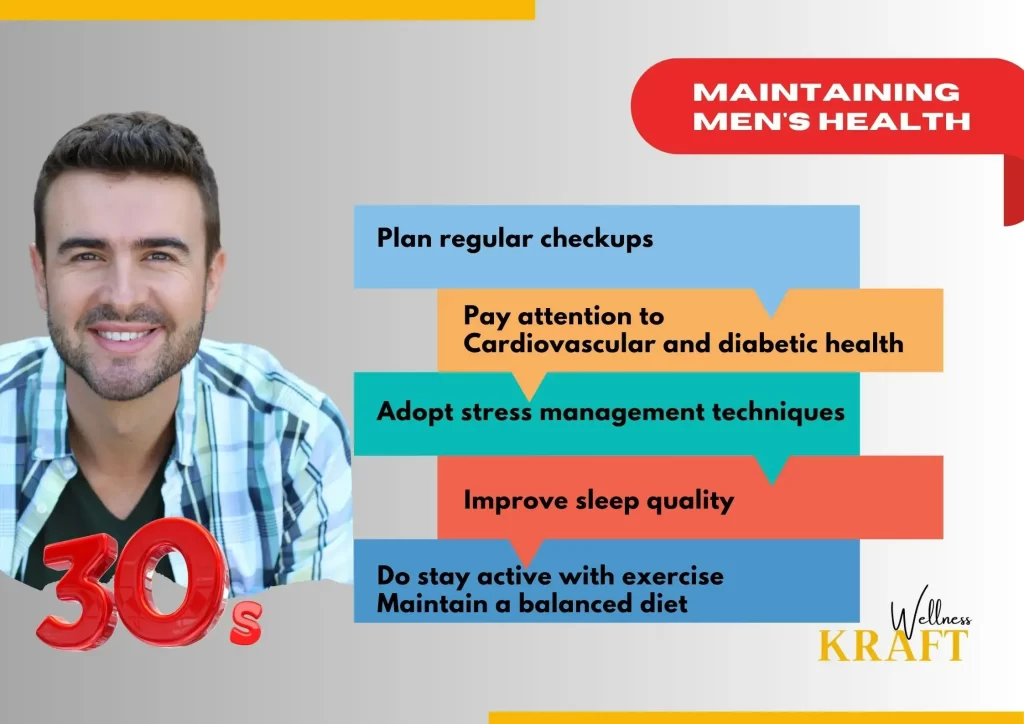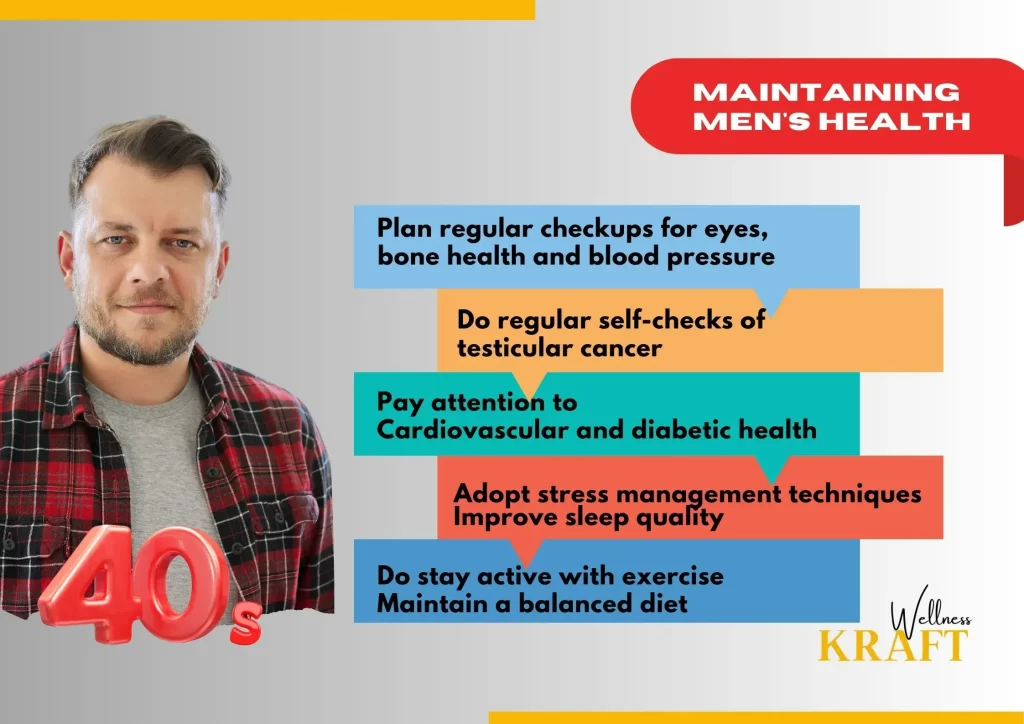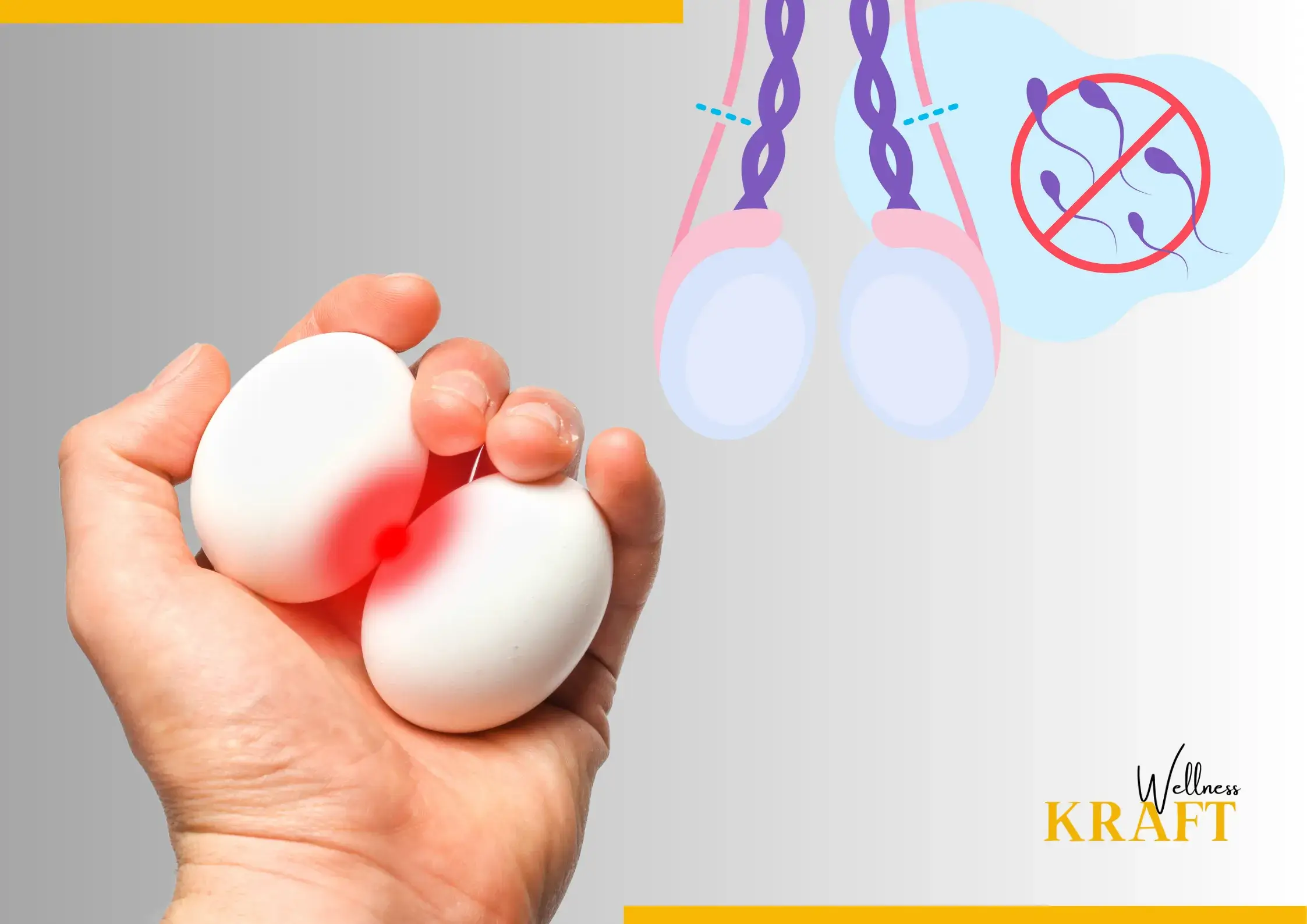“The highest kind of self-care is to prioritize one’s health.” – Wellness Kraft
Table of Contents
Introduction on Men’s Health Issues
Men of all age groups must prioritize their health, and take proper precautions and care related to Men’s Health Issues. As men go through different stages of life, they face men’s health issues that are unique to them. Men must be aware of these age-specific health concerns and take proactive steps to maintain their well-being. In this helpful guide, we will discuss men’s health issues linked to specific age groups, with a focus on men in their 20s, 30s, 40s, and beyond.
By knowing how their health changes at different ages, men can take control of their health and make healthy lifestyle choices to live a full and healthy life. Let’s look at some age-specific men’s health issues that are important to men and give them some helpful tips for maintaining their health and vitality throughout their lives.
Men’s Health Issues in their 20s

Men in their 20s often feel invincible and may not realize how important it is to maintain good health. But starting healthy habits when you’re young can set you up for a lifetime of health and well-being. Here are some important health issues for men to pay attention to during this stage:
1. Men in their 20s should plan regular checkups with their health care providers. These checkups can help keep an eye on all of your health, spot any possible issues early on, and give you a chance to talk about any concerns or questions you may have.
2. The most common type of cancer in young men is testicular cancer. So, it’s very important for men in their 20s to do regular self-checks to look for anything unusual. If lumps, growth, or pain are felt, it is important to see a doctor right away.
3. Your mental health is just as important as your physical health. Young adulthood can be a time of big changes in life, stress at school, and new jobs. Men must take care of their mental health by managing stress, getting help when needed, and maintaining a healthy work-life balance.
4. It’s important for both your physical and sexual health to have safe sexual habits. Using protection, such as condoms, can help prevent sexually transmitted diseases (STIs). It’s also important to get tested for STIs regularly and talk openly with your sexual partner.
5. Starting a healthy lifestyle in your 20s can help you for the rest of your life. Aim for at least 50 minutes of moderate-intensity exercise per week. Follow a balanced diet that is full of fruits, veggies, whole grains, lean proteins, and healthy fats. Limit how much booze you drink, and don’t smoke or use drugs for fun.
6. Nurturing healthy relationships and a strong support system is important for men’s mental and social well-being. Surround yourself with good people, keep the lines of communication open, and look for deep connections with friends, family, and loved ones.
Men can lay a strong foundation for a healthy future by concentrating on these health-related issues in their 20s. Remember that prevention is key, and taking proactive steps towards a healthy lifestyle now can have a big impact on your general health and well-being over time.
Men’s Health Issues in their 30s

As men get older, it becomes more important for them to take care of their health. This age frequently brings with it new responsibilities, professional advancements, and family planning. Consider the following key parts of men’s health to ensure optimal well-being during this time:
1. Set up regular checkups with your doctor or nurse to keep an eye on your general health. These appointments offer a chance to talk about concerns or questions as well as the early detection of any possible health issues.
2. Men in their 30s should pay attention to their cardiovascular health. Regular exercise, like aerobics and strength training, can help you keep a healthy weight, lower your blood pressure, and lower your risk of heart disease.
3. It can be hard to balance personal and work obligations in your 30s, which can make you feel more stressed. Your mental and emotional well-being can be supported by stress management techniques like exercise, mindfulness, and maintaining a healthy work-life balance.
4. A well-balanced diet is an important part of keeping your general health in good shape. Make sure your meals have a range of fruits, vegetables, whole grains, lean proteins, and healthy fats. Cut back on prepared foods, sugary drinks, and too much salt. Drink enough water throughout the day to keep yourself refreshed.
5. As people get older, their metabolisms slow down, which makes it easier to add weight. You can manage your weight and lower your risk of obesity-related health problems by adopting a healthy lifestyle that includes regular exercise and a nutritious diet.
6. Engage in regular physical activity to maintain fitness levels and promote health at any age. Aim for at least 150 minutes of moderate-intensity aerobic exercise per week, plus muscle-strengthening tasks on two or more days.
7. Getting enough good sleep is important for both men’s physical and mental well-being. Try to sleep for 7-8 hours straight every night. To improve sleep quality, establish a relaxing bedtime habit and make your bedroom comfortable.
8. Testosterone levels may start to drop in men in their 30s. Consult your health care provider to check your hormone levels if you have signs like a decreased libido, fatigue, or changes in your mood.
9. When you’re in your 30s, some health tests become more important. Some of these are looking at your cholesterol, keeping an eye on your blood pressure, and checking for things like diabetes or prostate cancer. Talk to your doctor to find out what kind of screenings you should get.
10. Ageing and participation in sports and other physical activities can occasionally result in injuries. Warm up before you exercise, use the right skills, wear protective gear, and pay attention to your body’s signs so you don’t overdo it.
By putting these parts of your health first in your 30s, you can set yourself up for a long and healthy life. Keep in mind that staying healthy is an ongoing process and that small, regular changes can make a big difference over time.
Men’s Health Issues in their 40s

As men get older, it’s even more important to put their health and well-being first. Changes in hormone levels, more work and family responsibilities, and a greater focus on preventive health care are all common at this time of life. Here are some important things men should think about for their health in their 40s:
1. Make an appointment with your doctor or nurse every year to check on your overall health. These appointments enable men to identify and manage any possible health issues early.
2. In the 40s, issues with the prostate, such as benign prostatic hyperplasia (BPH) and prostate cancer, became more common. Talk to your doctor about prostate-specific antigen (PSA) testing and any other screening or preventive steps that may be needed based on your medical history.
3. If you want to keep your heart healthy, you should exercise regularly, doing things like aerobics and strength training. To lower your chance of heart disease, keep an eye on your blood pressure, cholesterol levels, and weight.
4. As people age, their metabolisms naturally slow down, making weight management more important. Adopt a healthy diet that focuses on whole foods, limits processed and sugary foods, and limits the size of your portions. Regular physical activity, such as cardiovascular exercise and resistance training, can help maintain good health.
5. Men in their 40s should pay attention to their bone health to lower their chance of osteoporosis and fractures later in life. Make sure you eat enough calcium-rich foods, like dairy products, leafy greens, and products that have been added to them. Vitamin D, which you can get from the sun or from pills, is also important for healthy bones.
6. When you’re in your 40s, work, family, and your own demands can all add to your stress. Men should prioritize stress-relieving methods like regular exercise, mindfulness, hobbies, and keeping in touch with friends and family. If you need to, talk to a professional.
7. When you’re in your 40s, it’s important to get regular eye checks and hearing tests. With these tests, any changes or early signs of diseases like age-related macular degeneration or hearing loss can be found and treated in a timely manner.
8. Talk to your doctor about screenings that are right for your age, like cholesterol checks, blood pressure checks, and diabetes checks. Keep up with your immunizations, such as flu shots and other vaccines that are recommended for your age group.
9. Give quality sleep a high priority to improve your general health and well-being. Establish a regular sleep schedule, make your bedroom cozy, avoid using electronics right before bed, and take care of any sleep problems or disturbances.
10. Make time for self-care and find a healthy balance between work, family, and personal life. Set limits, involve your age in things that make you happy and relieve stress, and take care of your relationships.
Focusing on these parts of your health when you’re in your 40s can help you live a long, healthy, and happy life. Always be honest with your doctor, listen to your body, and do your research before making choices about your health and well-being.
Research Analysis on Men’s Health Issues
1) Physical exercise is important for keeping men in their 20s in good health, according to recent research. In 2019, the Journal of Physical Activity and Health revealed that frequent exercise during this period improves cardiovascular health, muscle strength, and chronic disease risk.
2) Research on young men’s mental health has increased. In 2020, the Journal of Adolescent Health reported that 20-something men’s stress levels were rising due to professional, academic, and personal issues. The study stressed the importance of stress management, mindfulness, and seeking support.
3) Men should monitor their cardiovascular health closely in their 30s. In 2018, the European Heart Journal reported an increased risk of heart disease in this decade. The study stressed the importance of a heart-healthy lifestyle, including regular exercise, a balanced diet, and frequent check-ups, to reduce cardiovascular disease risk factors.
4) The changes in sexual health and fertility among men in their 30s have been the subject of recent studies. Fertility rates dropped slightly over this period, according to 2017 Journal of Sexual Medicine research. The study also found that men in their 30s have erectile dysfunction and other sexual health difficulties. Professional advice and a healthy lifestyle were key to sexual health.
5) When men enter their 40s, prostate health examinations and monitoring become more crucial. The Journal of the National Cancer Institute reported in 2019 that prostate cancer risk rises with age. Early detection using screenings and prostate health assessment approaches were covered in the study. Knowing the symptoms, risk factors, and screening procedures can empower men to protect their prostate health.
6) Men may endure hormonal changes in their 40s, including a progressive drop in testosterone levels. The Journal of Clinical Endocrinology & Metabolism released research in 2016 on the effects of hormonal shifts on health, including energy, muscular mass, and libido. To manage these changes and investigate treatment choices, the study stressed the need of interacting with healthcare specialists.
Concluding Thought on Men’s Health Issues
In conclusion, keeping your health and well-being in good shape requires a whole-life approach that takes into account many different things. Taking proactive measures can have a big effect on a man’s overall health, from knowing what health issues men face at different ages to prioritizing nutrition, exercise, mental and emotional well-being, and sexual well-being.
As mentioned in the Wellness Kraft article it is important to be aware of the different health concerns that come up at different stages of life. Men can make well-informed decisions to improve their well-being by being aware of the distinct challenges and opportunities that each age group offers.
Men should concentrate on developing healthy habits in their 20s, such as regular exercise, a balanced diet, and staying away from risky practices. Preventative health measures, stress management, and maintaining a healthy weight become increasingly important in your 30s. Men in their 40s should focus on their cardiovascular health, prostate health, and general well-being, while those over 40 should also think about their bone health and prostate health. These steps and early care will help to solve Men’s Health Issues.
Key Takeaways on Men’s Health Issues
1. Men’s health is affected by many things, such as their age, their lifestyle choices, and their genes.
2. Each age group has its own health concerns, and men can make better decisions if they know what those are.
3. For general fitness and well-being, regular exercise, such as cardio, strength training, flexibility training, and balance exercises, is essential.
4. For the best nutrition, you need to eat a balanced diet with a range of fruits, vegetables, whole grains, lean proteins, and healthy fats.
5. Through stress control, social connections, and self-care practices, mental and emotional well-being should be prioritized.
6. For sexual health, it’s important to talk openly, have safe sex, and get tested for STIs regularly.
FAQs on Men’s Health Issues
1. What are some common health issues that men in their 20s face?
Men in their 20s may experience common health concerns like acne, sexually transmitted infections (STIs), sexual health issues like anxiety and sadness, and injuries from sports or physical activities.
2. How can men in their 30s keep a healthy lifestyle?
Men in their 30s should focus on maintaining a healthy lifestyle by engaging in regular exercise to keep their muscles strong and their cardiovascular fitness strong. They should also pay attention to their diet by eating foods that are high in nutrients and keeping their weight at a healthy level.
3. What are the best rules for men in their 40s when it comes to exercise?
Men in their 40s should exercise a mix of aerobic, strength, and flexibility exercises. Aim for at least 150 minutes of moderate-intensity aerobic exercise per week, plus muscle-strengthening activities on two or more days.
4. How does nutrition affect the health of men at different ages?
Men’s health at different times is greatly influenced by nutrition. Men in their 20s should focus on eating a balanced diet full of fruits, vegetables, whole grains, and lean proteins to support their general growth and development.
5. What are some useful stress management techniques for men?
Men can effectively manage their stress through regular exercise, deep breathing exercises, mindfulness meditation, participating in hobbies or activities that make them happy, seeking social support, and maintaining a healthy work-life balance.
6. How does sexual health affect a person’s overall well-being?
Men’s general health and well-being depend on their sexual health, which is also crucial to their overall well-being. It includes things like having healthy, mutually agreeable sexual relationships, having safe sex, getting tested for STIs regularly, talking about sexual concerns or problems, and keeping good communication with partners.
7. How can men improve how well they sleep?
Men can improve their sleep quality by sticking to a regular sleep plan, making a relaxing bedtime routine, making sure they have a comfortable bed, avoiding caffeine and electronic devices before bed, and managing their stress levels.
8. What are some signs of concern about men’s mental health?
Men who are experiencing mental health concerns may feel sad or hopeless all the time, lose interest in things they used to enjoy, experience changes in their appetite or sleep habits, become agitated, have trouble focusing, and stop participating in social activities.
9. How can men keep their weight at a healthy level as they age?
Men should focus on regular physical activity, such as cardiovascular exercise and strength training, to maintain a healthy weight as they age. They should also watch how many calories they eat and eat a diet full of foods that are high in nutrients.
10. Is there a certain diet that men should follow to keep their prostates healthy?
For men’s prostate health, it’s best to eat a diet full of fruits, veggies, whole grains, and healthy fats (like those found in nuts, seeds, and fatty fish) and limit red and processed meats. Some studies show that foods high in lycopene, like tomatoes, may be good for the health of the prostate.










